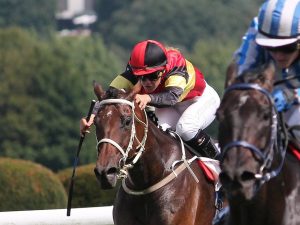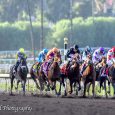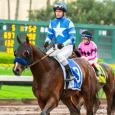By Ray Wallin
At that first glimmer of warm weather every year I do a spring cleanup in the yard. The hoses put out, the deck and outdoor furniture power-washed, the beds blown out, and dead remnants of old plantings removed. From there I move on to the garage, putting the snow blower back in the shed and sweeping out the dirt and salt that accumulated over the winter.

Image by Alex Gresbek from Pixabay
Right now 3-year-old horses are developing and making strides towards their runs at the Triple Crown, if there is one since the coronavirus pandemic has caused the races to be rescheduled, and hopefully be run in the fall. Summer tracks hopefully will have a chance to open their stables and conduct a meet, even if it has to be shortened – and run with limited or no spectators.
Nonetheless, whether you are a weekend warrior or you make your living playing the races, it is time to do some spring cleaning of your handicapping.
1. What Does or Doesn’t Work
You’ve had all winter since your favorite summer meet ended to review your records. No time like the present to take a look to see which of your angles or figures worked or didn’t work last year.
Horse racing is an ever changing game. What has worked for you for years may not continue to work in the future. How will you know if your homemade speed figure is still producing winners in dirt claiming sprints if you don’t keep records that you can check year after year?
In some cases the track bias may change. I remember when Turfway Park installed their Polytrack surface in 2005. The success of my pace projections dropped like my 401K during the last recession. The new surface made it a new game and I had to adjust my approach there accordingly by keeping records during the meet and seeing how they stacked up to the prior year.
Fast forward to 2020 and Turfway plans to replace the Polytrack surface with Tapeta for the winter 2020 meet, if there is one. While I no longer follow Turfway the same way I did 15 years ago, I wonder how this change will affect the track bias and the local handicapper’s approach this time.
2. What Were Your Goals Last Year
Every handicapper should have goals each year. It may be monetary, such as clear a certain dollar value in profit, or it could be a functional, such as improve the results of your homemade pace figure.
You have to ask yourself, did you achieve your goals from last year? Why or why not?
If not, what could you have done better to get you closer to achieving those goals? Was it not enough time to commit to the process? Was it something completely out of your control such as a distant work assignment? Was it sheer laziness?
Regardless, it is time to refocus and think about not only what your goals are, but how you can be SMART about trying to achieve them this year.
3. How Was Your Record Keeping
If you had to give yourself a grade for how good you were at keeping records of your wagering and the performance of your angles and figures, how would you do? Did you give yourself an “A” or a “C”?
A majority of handicappers that I know fall into the “C” or “D” range. They start off with the best of intentions, but never follow through. It can be overwhelming to spend the time the day after the races logging the information into spreadsheets. Our friend Rail Guy does keep the best records. In his mind he would rather “spend da time cappin’ da races than lookin’ at da old ones,” since he claims to know what works and doesn’t work.
The truth is that if you don’t keep records of the performance of your angles or figures, you won’t really know how well they are performing. Winning horseplayers know what works because they put in the extra effort after the races are over.
4. How Are You Betting
Some states have more legal betting options than others. It is not uncommon for a sports gambler or horseplayer to have accounts with multiple sports or race books. When I play sports I shop around for the best line I can find on a game. When I see William Hill has a play I like at -3 +110 and Caesar’s has the same play at -3 +105, I am going to put my bet in at William Hill.
Generally you can’t lock down on specific odds with horse racing. While some sites do offer exchange wagering, most don’t. You are still subject to the pari-mutuel pool through most legal ADWs in the United States. What you can control is betting through the racebook that is offering the best promotions or rebates. Does one book provide betting or deposit matches? Does one racebook offer a rebate percentage on every wagered dollar at a better rate than your other account?
If you don’t know about the available promotions or rebates, it is time to check them out. If you are using an offshore racebook, be sure to understand what the payout caps are so that if you do hit that 50-1 shot as a win bet, you don’t find out later that the offshore book caps the payout at 35-1.
5. What Are You Going to Improve On
It is time for “lessons learned” or a “plus-delta” session. The former term is more self-explanatory than the latter, but it is something I see in business all the time. At the completion of a project there is often a meeting where all the major players come together to assess not only the outcome of the project, but how we did from the beginning of the process.
A “plus-delta” session starts of by listing the “pluses”, or what went well through course of the process. For your handicapping it may be that you followed a routine or checklist that meant you didn’t miss that lone early speed horse or when a horse had some hidden back ability in their running lines. The “deltas” are what you felt you could have done better. Did you still struggle with assessing maiden second time starters? Did you still find that you had a hard time picking between two off-the-pace horses when you knew the early speed was a bust?
What can you do with these “deltas” to improve future outcomes? Is there a book that you want to read on the topic of speed, pace, or conformation? Do you have an idea for a stat to track that may help you make better decisions in the future?
6. How Healthy Is Your Bankroll
Where does your bankroll stand now versus last year? Did it grow? Did you keep it separate from other funds or did it get commingled with your Super Bowl Square fund or did you use some of it to buy that new snow blower?
Regardless of where it is now, you need to make sure that moving forward it is a separate fund that you carefully track and monitor. It doesn’t all have to be tied up in betting accounts, but you should know that you have a specific amount of money between both your bank and betting accounts that is earmarked for wagering. This will keep you accountable for each dime in your bankroll.
While the spring of 2020 is unlike any other, it does provide you with ample time and opportunity to do some spring cleaning of your handicapping. Other than finally cleaning out that shed, what other handicapping items can you think to do a little spring cleaning on?
If you enjoyed this piece, check out other articles at our horse racing news section!




